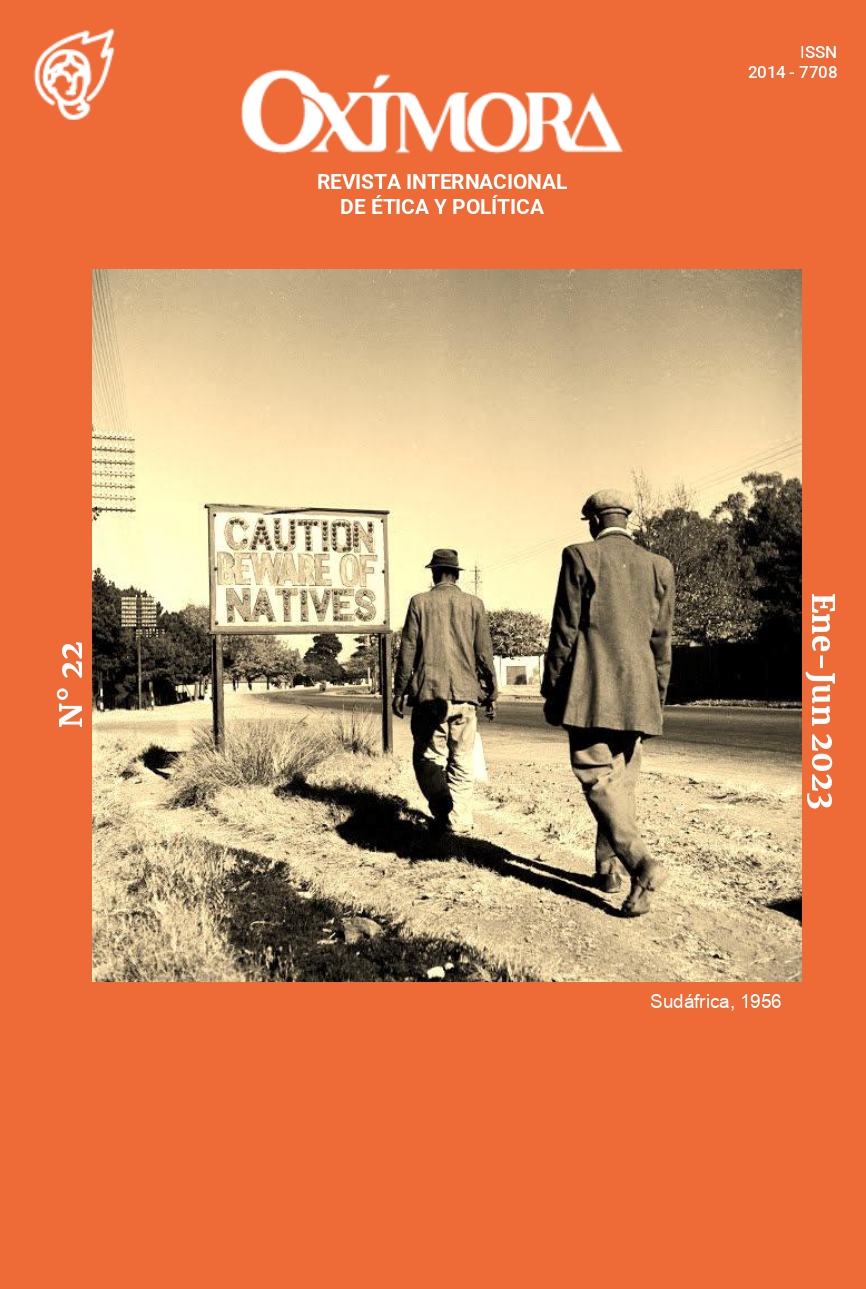Epistemology of Decisions: the Relational Construction of Non-Existences
DOI:
https://doi.org/10.1344/oxmora.2023.i22.41045Keywords:
Epistemic Existence, Epistemicide, Metaargumentation, ReasonablenessAbstract
This article explores the idea that "epistemic existence" is a relational condition that comes about when one actively participates in making decisions that concern them. In the first place, this concept is reviewed in the context of face-to-face relationships, appealing to a typical case of a couple in which both -without realizing it- are epistemically constructed as non-existent. The operation of an epistemicidal functioning logic is shown. In the second part, it is proposed that an exit strategy from this mode of operation would be based on the possibility of meta-arguing. To do this, a distinction is made between the informational level and the relational level of the conversations (it is also suggested that this difference may itself be a source of new conflict). In the third and fourth sections, it is analyzed how the oppositional dynamics between affectively linked interlocutors acquire an emotional tint that greatly complicates the argument, especially when the arguers share -without knowing it- a contentious or bellicose representation about the exchange of reasons. Finally, it is concluded that these epistemic practices are detrimental to possibility of increasing the degree of reasonableness between the interlocutors, thereby preventing the emergence of less painful ways of inhabiting disagreements.
References
Aberdein, A. (2010). Virtue in argument. Argumentation 24(2), 165-179.
Bateson, G. (1972). Steps to an Ecology of Mind: Collected Essays in Anthropology, Psychiatry, Evolution, and Epistemology. University Of Chicago Press.
Brockriede, W. (1972). Arguers as Lovers, Philosophy and Rhetoric, 5(1), 1–11.
Casey, J. (2020). Adversariality and Argumentation, Informal Logic, 40(1), 77–108.
Cecchin, G., Lane, G. & W. Ray. (2003) Irreverencia: Una Estrategia de Supervivencia Para Terapeutas, Barcelona: Paidós Ibérica ediciones.
Cohen, D. (2019). Argumentative Virtues as Conduits for Reason’s Causal Efficacy: Why the Practice of Giving Reasons Requires that We Practice Hearing Reasons, Topoi, 38, 711–718.
Correia, V. (2012). The ethics of argumentation. Informal Logic 33(4), 471-485.
Gascón, J.A. (2015a). ¿Es posible (y deseable) una teoría de la virtud argumentativa?. Actas I Congreso internacional de la Red Española de Filosofía 1, 41-51.
Gascón, J.A. (2015b). Arguing as a Virtuous Arguer Would Argue. Informal Logic 35(4), 467-487.
Gascón, J.A. (2015c). Prácticas argumentativas y virtudes intelectuales: Una Mirada intercultural. Revista Iberoamericana de Argumentación 10, 1-39.
Gascón, J.A. (2016). Virtue and Arguers. Topoi 35, 441-450.
Gascón, J.A. (2020). “Las Motivaciones en la Argumentación”. En Cristian Santibáñez (ED.) Emociones, Argumentación y Argumentos Lima: Palestra. 53-74
Gascón, J.A. (2021). La metáfora de la confrontación y los argumentadores razonables. CRÍTICA, Revista Hispanoamericana de Filosofía. 53(158). 23–46. DOI: 10.22201/iifs.18704905e.2021.1269
Gensollen, M. (2015). Virtudes argumentativas. Conversar en un mundo plural. Aguascalientes: IMAC-CONACULTA.
Gensollen, M. (2017). El lugar de la Teoría de la virtud argumentativa en la teoría de la argumentación contemporánea. Revista Iberoamericana de Argumentación, 15, 41-59. doi: 10.15366/ria2017.15
Gilbert, M. (2020). “Emoción en los argumentos. Usos y expectativas”. En Cristian Santibáñez (ED.) Emociones, Argumentación y Argumentos Lima: Palestra. 75-96
Goffman, E. (1981). Forms of Talk. Filadelfia: University of Pensilvany Press.
Hample, D. (2005). Arguing: Exchanging Reasons Face to Face. Mahwah, N.J.: Lawrence Erlbaum Associates.
Kunda, Z. (1990). The case for motivated reasoning. Psychologucal Bulletin, 108(3). 480-498
Kunda, Z (1999). Social Cognition: Making Sense of People. MIT Press.
Pereda, C. (1994). Vértigos argumentales. Una ética de la disputa. Barcelona: Anthropos & UAM-Iztapalapa.
Pereda, C. (1996). ¿Qué es un buen argumento? Theoria. Segunda Época, 11(25), San Sebastián: Universidad del País Vasco, 7-20.
Pereda, C. (1999). Crítica de la razón arrogante. México: Taurus-Alfaguara.
Rooney, P., 2010, Philosophy, Adversarial Argumentation, and Embattled Reason, Informal Logic, 30 (3), 203–234.
Schreier, M., N. Groeben, U. Christmann. (1995). That’s not fair! Argumentational integrity as an ethics of argumentative communication. Argumentation 9(2), 267-289.
Schreier, M. & N. Groeben. (1996). Ethical guidelines for the conduct in argumentative discussions: An exploratory study. Human Relations 49/1, 123-132.
Tannen, D. (1991). No fue lo que quise decir. México: Paidós.
Downloads
Published
How to Cite
Issue
Section
License
Copyright (c) 2022 María Luján Christiansen

This work is licensed under a Creative Commons Attribution 4.0 International License.
a) Authors retain copyright and grant the journal the right of first publication.
b) Texts will be published under a Creative Commons Attribution License that allows others to share the work, provided they include an acknowledgement of the work’s authorship, its initial publication in this journal and the terms of the license.



